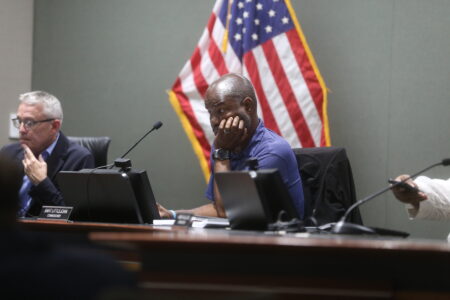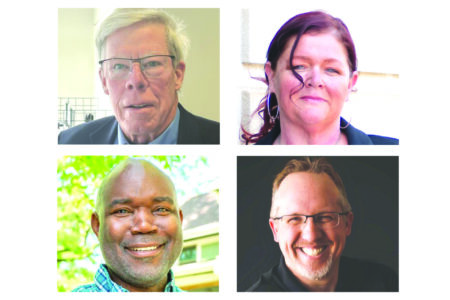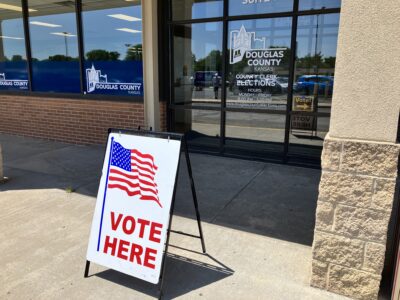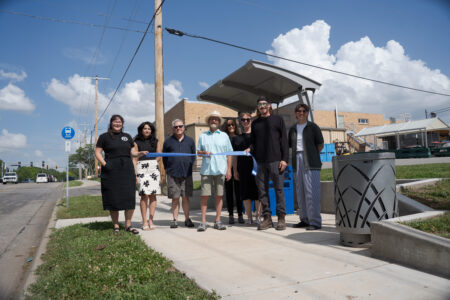KU lands $25 million gift for continued work at football stadium, surrounding Gateway project
$750M project faces a key vote at Lawrence City Hall next week
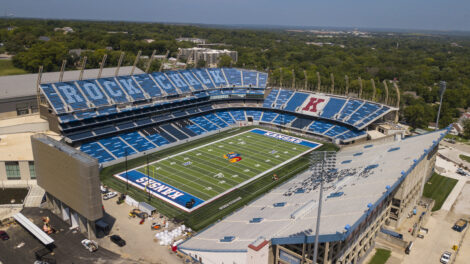
Construction continues at David Booth Kansas Memorial Stadium on Monday, July 28, 2025. Photo by Nick Krug
For the University of Kansas’ Gateway project — the $750 million renovation and redevelopment of the football stadium and the area around it — there are big stakes on the horizon.
Now, there is a big new private donation on the books, as well.
KU on Wednesday announced that Paul and Linda DeBruce — Kansas City entrepreneurs in the agriculture industry — have made a $25 million gift to the Gateway project at 11th and Mississippi streets.
“We’re so grateful for the DeBruce family’s generosity and continued legacy of loyal support for KU,” Chancellor Douglas Girod said in a press release. “This incredible gift is an investment not just in the Gateway District but in our university, our students and the state of Kansas.”
The gift comes as KU leaders are seeking to secure more than $300 million of additional support and investment to begin the phase II renovations at the stadium site. The first phase of the project is nearing its completion and will have its official unveiling when KU plays its first game in the revamped stadium on Aug. 23.
That approximately $450 million first phase included a complete tear down and rebuilding of the west side and north end of the stadium, with a host of new amenities, suites, luxury seating areas and new infrastructure.
The DeBruce name will be on one of those new gathering spots. KU is naming a “premium hospitality space” inside the stadium the Paul and Linda DeBruce Jayhawk Club, KU said on Wednesday. The space will provide higher-end food, drink and mingling options for fans on game days, and will serve as a dining area for student-athletes on non-game days.
The first phase of the project also includes a new conference center with a 1,000-seat banquet hall in the north end of the stadium. When the facility opens this fall, it will be the largest in Lawrence, and KU and state leaders have made investments in the center with the idea that it will attract regional and national conferences to Lawrence.
The ultimate success of the second phase of the Gateway project, however, likely will go a long way in determining whether the conference center becomes a major attraction. The second phase would include an approximately 160-room hotel that would be connected to the stadium and the conference center. It also would include a complete refurbishing of the east side of the stadium, new student housing near the stadium, additional restaurant and retail spaces, and 1,000 underground parking spaces just east of the stadium.
KU leaders hope to begin the second phase of the project after the conclusion of the upcoming football season. But the project is about to enter a critical stage. The Lawrence City Commission at its Aug. 12 meeting is scheduled to vote on a key financing provision for the Gateway project.
The University is seeking to use STAR bond financing, which basically will allow any new sales taxes collected at the stadium site and the surrounding campus to be diverted from state and local government coffers, and instead be used to pay infrastructure improvements at the site, such as the underground parking.
In total, KU is estimating the STAR bonds — which is the same financing program that kickstarted development at the Kansas Speedway and other major attractions in the state — will provide about $60 million to the project.
KU is counting heavily on the $60 million in STAR bonds to help the project meet its approximately $300 million budget for the second phase. Part of the funding will come from private investors — a group led by the development firm that oversaw the rebuilding of Kansas City International Airport — that will own the hotel and other commercial spaces on the site. Part of the money will come from additional donations from KU supporters, like the DeBruce donation. But KU officials have said the $60 million in STAR bond financing is the missing piece that makes the project financially feasible.
Plus, they also are touting it represents a major investment by the State of Kansas in the Lawrence community. The state provided $85 million in funding for the first phase of the Gateway project, using economic development funds and infrastructure grants that became available during the post-pandemic recovery programs. KU is now estimating that of the $60 million STAR bond totals, approximately $40 million of that amount are dollars that normally would go to state coffers. The remaining $20 million would be sales tax dollars that normally would go to local governments.
How city commissioners view the project, though, will be critical. The Lawrence City Commission essentially has a veto authority over the STAR bond component of the project. State law requires not only approval from the state’s commerce department but also from the local city commission where STAR bonds are to be used. Additionally, the law requires a super majority vote of the commission, meaning four of the five commissioners will need to approve of the plan before the STAR bonds can proceed.
In May, city commissioners took a procedural vote on the STAR bond proposal. It passed with support from four of five commissioners, meaning KU can’t afford to lose a single vote. Commissioner Amber Sellers was the lone vote against.
The project in May received a key recommendation from City Manager Craig Owens, who touted the project as a “generational investment by KU and its donors.” The recommendation also came after KU Endowment Association made an offer to provide the city at least $4 million worth of land to be used for affordable housing projects, and the private developer of a proposed hotel and student housing complex is offering to cover $14.5 million in city costs to improve the Ninth Street corridor and stormwater systems near the football stadium.
However, the city is awaiting a key financial analysis that is expected to be delivered to commissioners later this week, and the project has drawn some concern from neighbors and people who question whether governments should be offering large economic development incentives.
KU’s chief financial officer Jeff DeWitt recently told the Journal-World that KU has stayed engaged with the Lawrence City Manager’s office since the May meeting, but hasn’t yet received many questions from city commissioners about the project. KU officials, however, will be on hand at next week’s key meeting, and will be prepared to again make the case for the project, DeWitt said.
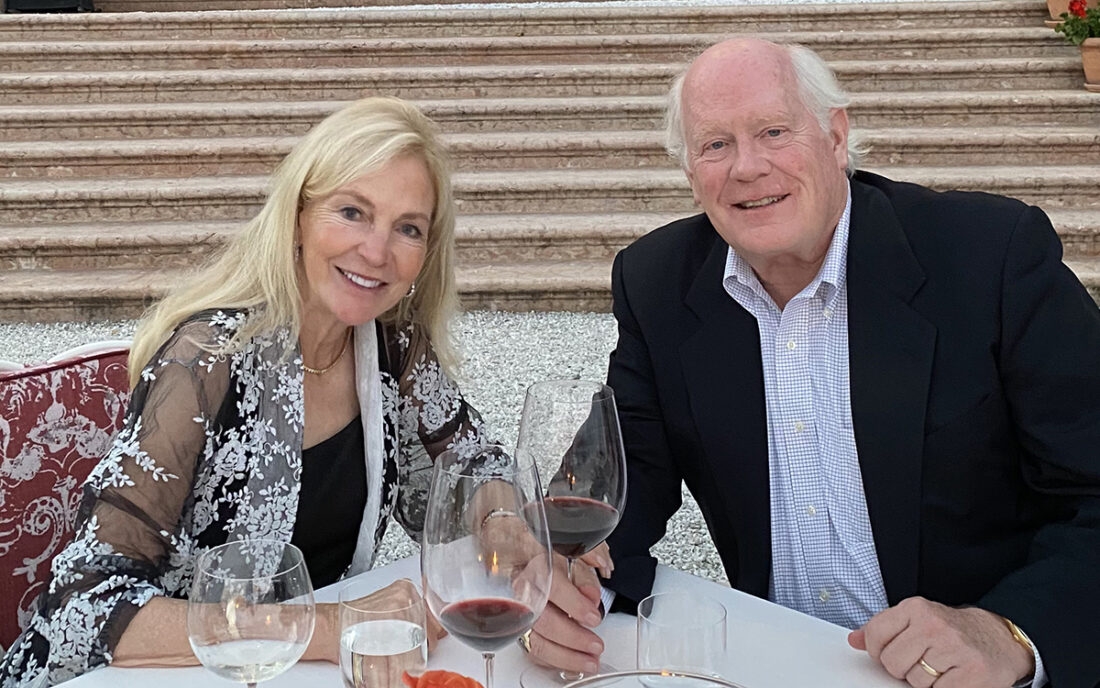
photo by: Submitted
Linda and Paul DeBruce
Meanwhile KU fundraisers have remained active on the project, as evidenced by the DeBruce gift.
“We appreciate the strong educational foundation KU provided to us and the great friends and memories we’ve made at KU games throughout the years,” Paul DeBruce — founder of the large international grain-trading firm DeBruce Grain — said in a KU press release. “We’re proud to support a project with impact of this magnitude.”
With the gift, the DeBruce name will now be connected to both the KU football and basketball programs. The couple — who are both KU graduates — provided the lead gift for the DeBruce Center, which opened in 2016 and is connected to Allen Fieldhouse. Among other attractions, the center houses James Naismith’s original rules of basketball.
“We are in awe of all that the DeBruces have done for Kansas Athletics and are so grateful that they are rising to the occasion at this critical moment,” KU Director of Athletics Travis Goff said in a release. “The Gateway District and the reimagined David Booth Kansas Memorial Stadium will be a landmark destination for generations to come thanks in large part to their vision and generosity.”
Linda DeBruce said the family was eager to be connected to another KU athletic endeavor.
“KU Athletics keeps Jayhawks connected to the university,” Linda DeBruce said in a press release. “It truly is the ‘Gateway,’ so this project is aptly named.”


